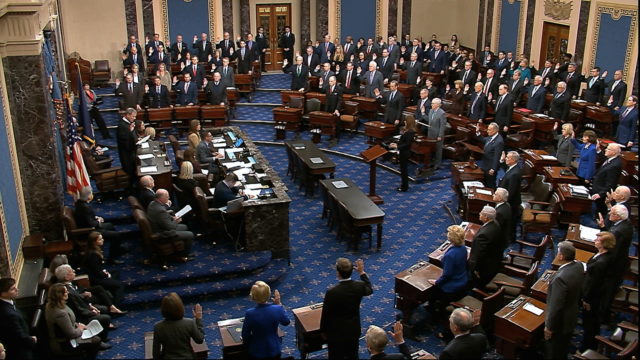By Vivian Roach and Darby Good | Staff Writer and News Editor
Chief Justice John Roberts called to order at noon Thursday the third impeachment trial in history. Justice Roberts swore in the Senate as jury members in the continuation of impeachment proceedings, with hearings beginning Tuesday.
The House of Representatives impeached President Trump on Dec. 18 with a vote of 230-197 to charge the president with abuse of power and 229-198 to add a charge of obstruction of Congress. The House vote almost directly went along party lines.
The House held the articles of impeachment for nearly a month before they were sent to the Senate on Wednesday, and officially received by Senate majority leader Mitch McConnell the following day. Rebecca Flavin, senior lecturer of political science at Baylor, offered her expertise on the history behind impeachment.
Members in the House open the impeachment process with an inquiry, and proceed to act as grand jury. In the case of Trump, speaker Nancy Pelosi announced the formal inquiry. The House vote officially impeaches the president, and the articles of impeachment move to the Senate for a proceeding to decide if the impeached president should be removed from office.
“Senate acts as a jury, making the decisions, voting on whether to convict the person of the charge of impeachment, stripping them of their position,” Flavin said.
In a presidential impeachment, the chief justice of the Supreme Court officiates in the Senate. “It is not a legal proceeding in the sense that it goes before the Supreme Court, it’s something that happens when the president is the one impeached,” Flavin said. “What’s at the core of both of those is basically an argument that he is violating the Constitution,” Flavin said, summarizing the cause for any impeachment.
Now in the Senate, the articles of impeachment need a two-thirds supermajority vote to remove Trump from office. The Senate is where Bill Clinton and Andrew Johnson’s impeachment cases were dismissed. The House currently holds a Democratic majority, opposite of the Republican-controlled Senate.
Flavin said Congress may still publicly reprimand Trump. “That’s more embarrassing, where it’s an official slap on the wrist, censuring him or criticizing him.”
Dennison sophomore Jake Neidert, vice chair of the Young Conservatives of Texas at Baylor, doesn’t necessarily think the impeachment is a bad thing for Trump.
“Trump’s base is energized by this and across the country, and in this state, Trump is enjoying historic levels of support amongst Republicans,” Neidert said.
The night of Trump’s impeachment, he held the longest campaign speech of his presidency at a rally for almost two hours in Michigan.
Cape Giradeau, Mo., junior Michaela Scott said that she thinks the Democratic Party was successful in finding concrete evidence against President Trump.
“The goals of the party were to find actual law that had been broken. I think they accomplished that with a guilty charge,” Scott said. “With the seven senators set to argue the articles, I think the party is hoping for a similar ruling in the Senate.”
However, Neidert argues the impeachment charge was initiated to give political gain to the Democratic party.
“The impeachment was initiated to create artificial momentum on which Democrats hoped to gain votes for the election this year, and is simply the newest iteration of false-scandals that are created by the Democratic Party and perpetuated by a dishonest media,” Neidert said.
Flavin believes the political talk surrounding the impeachment proceedings has made the process hard for citizens believe in the system.
“Part of it is just fodder for the talking heads to blabber on about. I think that sometimes that is injurious of the whole process, makes it hard to look at in good faith,” Flavin said.



